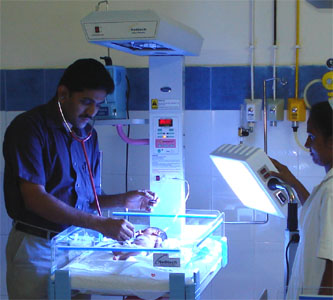Newborn babies who need intensive medical attention are often admitted into a special area of the hospital called the Neonatal Intensive Care Unit (NICU). The NICU combines advanced technology and trained health care professionals to provide specialized care for the sick babies. NICUs may also have intermediate or continuing care areas for babies who are not as sick but do need specialized nursing care. Most babies admitted to the NICU are premature (born before 37 weeks of pregnancy), have low birth weight (less than 2.5 kg s), or have a medical condition that requires special care such as heart problems, infections, or birth defects . If the situation arises, critically ill newborns receive specialized care from our team of neonatologists in our family-centered, technologically advanced Level II NICU. Our program strives to serve the needs of the entire family and to deliver hope and compassionate care--both before and after they leave the hospital. A special focus on providing parent education, emotional support and critical resources, helps families develop the confidence to care for their baby at home.

The NICU is one of the best-equipped units in the country. In addition to state-of-the-art warmers, invasive and noninvasive monitors and pulse oximeters, there are modern ventilators and oxygen delivery devices. This ensures safe and effective ventilation of very tiny preterm infants and even post-operative care of infants undergoing complex and open-heart surgeries. The laboratories in the hospital offer the latest in all investigations. A High Frequency Oscillatory Ventilator is also available to treat newborns with severe lung disease Click here for details
Control of hospital-acquired infection is crucial to good outcomes in neonatology. The unit is reputed for stringent infection control protocols and boasts of a very low rate of nosocomial sepsis. This is possible because of ongoing surveillance in consultation with experts in infectious diseases and microbiology. This has significantly improved survival of premature infants with extremely low birth weight (less than 1 kg) and shortened hospitalization for surgical cases.
Admission in NICU is a scary experience for new parents. The sight of sick, tiny babies with wires and tubes all over and the constant beep of monitors can cause nightmares. We do everything possible to make the families as comfortable as possible. The condition of the baby is explained to the parents by consultants, duty doctors and nurses in detail, several times a day. Parents and families are closely involved in decisions about management. The doctors and nurses are also trained to counsel families to deal with the stress.
Nurses trained in kangaroo mother care and lactation counseling offer support to ensure breast feeding even in the sickest babies. Facilities to pump and store breastmilk are being constantly upgraded. Classes are held periodically by social work students or nurses on breastfeeding and other aspects of newborn care.
We actively promote own mothers' milk feeding and breastfeeding through several activities. Staff education about the importance of breast milk is constantly happening.
The following are examples of the varied Neonatal Problems, the NICU caters to:
Neonatal Respiratory Distress Syndrome (RDS, HMD), Meconium Aspiration Syndromes, Persistent Pulmonary Hypertension (PPHN), Septic Shock, Various Neonatal Surgical Problem. E.g. Tracheo - Esophageal Fistulas, Congenital Diaphragmatic Hernia etc.